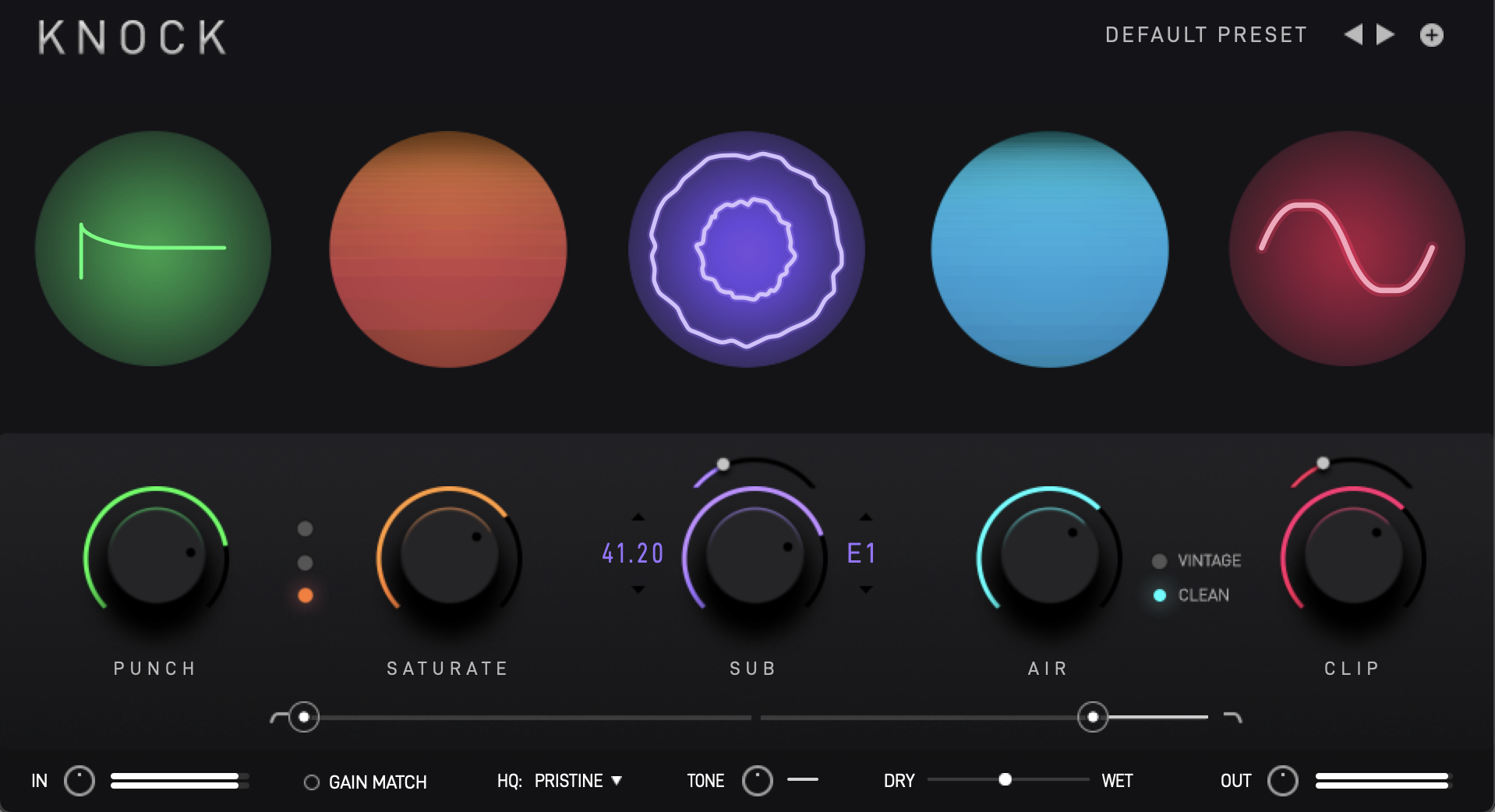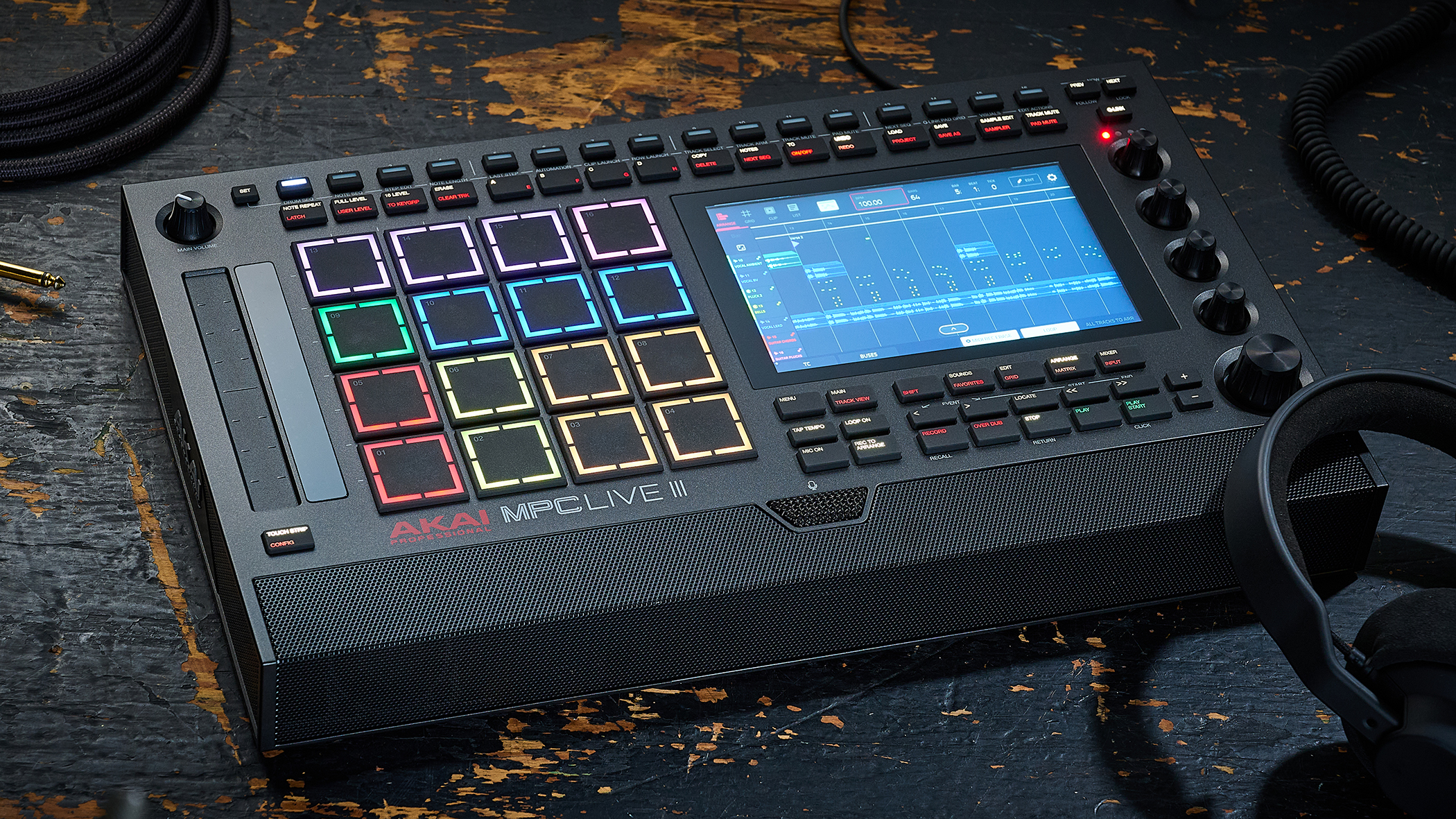“I'm getting on an airplane, I'm listening to a song and it has my sound in it”: How DECAP's Drums That Knock became the must-have sample pack for modern producers
With his astronomically popular samples featuring on hits by the likes of Charli XCX and Kendrick Lamar, DECAP is launching a new plugin that distills years of expertise into an easy-to-use drum production toolkit

Want all the hottest music and gear news, reviews, deals, features and more, direct to your inbox? Sign up here.
You are now subscribed
Your newsletter sign-up was successful
If you don’t know his name, you definitely know his sound. As the man behind the hugely popular Drums That Knock sample libraries, DECAP’s expertly crafted percussion hits have embedded themselves into modern music and made fans of producers worldwide.
Which is why our ears perked up when news broke that the California-based producer was taking all that knowledge and distilling it into a new drum-focused plugin – the appropriately named KNOCK. “I wanna give you the tools that I use to make my drums,” DECAP says of his new venture. “That was the core concept.”
Released under his newly-founded brand, KNOCK Audio, KNOCK is a lightweight plugin that delivers hefty sonics. The interface centres on five core sound-shaping tools for controlling compression, saturation, EQ, clipping, and introducing sub-harmonics. The plugin’s minimalistic design was an intentional choice on DECAP’s part, with a balance between accessibility and versatility at the front of his mind.
“I didn't want anyone to have to look at an instruction manual,” DECAP says of the design ethos he brought to the table. “If you're a beginner producer, you can just start turning knobs and immediately you get a sound that inspires you.
“At the same time,” he continues. “If a legendary engineer gets their hands on it, someone who knows their shit and makes records for a living, they can dial in something that has the sonics to take a track to the next level. So, I wanted to walk that line between something that was beginner-friendly but also had the power a pro user would need.”
Of course, none of this was easy to achieve. “The creation process was meticulous,” he recalls. “It took about 18 months – and it was also my first plugin, so I didn't know what I didn't know.”
Putting together a development team, defining and refining KNOCK’s feature set, iterating past software bugs, and keeping everything focused on the core goal of making a truly useful production tool, was all new territory for DECAP. “The process of creating a plugin was a little more challenging than I expected,” he readily admits. “In Ableton you can move things around, tweak settings and add things. But when you're working with DSP, there's a trial-and-error process – if you change something then something else can break and you have to fix it. I really had to put on a technical hat.”
Want all the hottest music and gear news, reviews, deals, features and more, direct to your inbox? Sign up here.

Despite the effort involved, DECAP says that, after nearly a decade perfecting the craft of sampling, the time was right to channel his experience into the KNOCK plugin. “In the beginning, Drums That Knock was just about hitting super hard,” he reflects. “As I became a better sound designer, I realised the nuances in the way a kick drum hits. You make it too loud, it's squashed, you don't make it loud enough, it doesn't have the punch. You gotta find that sweet spot, and KNOCK is a tool to help people to find that sweet spot.”
Back in 2016, when DECAP was getting ready to unleash his first sample pack, he had no way of knowing the impact it would have. “I wanted to put something together for me,” he says. “I wanted a pack of sounds I could use that were all really consistent, that would hit hard. So, I went through all my projects and got together sounds that I’d made over the years. And then I thought, ‘why don't I release this? Just put it out and see what the feedback is.’”
The response, he recalls, was almost immediate. “Right away it had an impact that was surprising. I wasn't expecting producers to be like, ‘oh my God, I've been waiting for this.’ It got the attention of a lot of people who I was a fan of, a lot of momentum, a lot of buzz.”
"I wasn't expecting producers to be like, ‘oh my God, I've been waiting for this.’"
As it steadily grew to become one of the most popular sample packs on Splice, DECAP had the surreal experience of hearing his work begin to pop up in hit songs. “I'm getting on an airplane, I'm listening to a song and it has my sound in it. I started hearing songs that were based around my loops.”
It was about a year after the first pack dropped that DECAP recalls a tipping point, where he felt the cultural impact of the sounds he’d been making. “Around 2017 the song Slow Hands came out by Niall Horan from One Direction. It had three notes and a shout, ‘dun, dun, dun, woo!’ It was my shout. That song got played on the radio that whole year, so it was pretty epic hearing my work used on the airwaves.”
There are now ten volumes of Drums That Knock, and DECAP’s sounds have featured on tracks by the likes of Charli XCX, Eminem, Kendrick Lamar, and Bad Bunny. So, what is it about these samples that makes them catch the ear of music’s biggest and brightest? “On one side, from a technical standpoint, they hit hard and loud consistently,” DECAP says by way of explanation. “Everybody wants their music to stand out, everyone wants their stuff to be punchy and to cut through in the mix. When they come to Drums That Knock, they know it's gonna do that.

“On the other side,” he continues. “I put a lot of love and attention into them – I don't just churn out these things quickly, I take my time and craft each sound, each loop. I mix it like I would mix a record. So, when they get a loop, they know it's gonna be really well balanced and radio ready.”
Volume one may have contained all the ingredients for breakout success, but the continued popularity of Drums That Knock year after year can be attributed to DECAP’s determination to grow as a producer. “From when I first started, to now, I would say I've gotten way deeper into sound design,” he says of that journey.
“When I saw the impact that the first pack had, I felt like I had a responsibility to fill the gaps in my knowledge, build my skills, and become a better sound designer. I really started diving into the craft – learning synthesis techniques for kicks and snares, and dialling in with effects. I wanted to make sure that I took things to the next level.”
One thing that certainly hasn’t changed is the punching power of DECAP’s samples – each one lands like a sonic body blow. That production style is anchored in the golden age of early-00s hip-hop, with Dr. Dre, Wu-Tang, and DJ Premier all getting name-checked by the producer as key reference points.
“The Chronic 2001, sonically and musically, was just a masterpiece,” DECAP says of Dr. Dre’s seminal turn-of-the-millennium magnum opus. “To this day, I'm still blown away when I hear that record. It doesn’t sound outdated, it’s still so clean. In hip-hop, drums have always been an element that captivated me; there was something about the beat that felt cathartic and energetic. I think Drums That Knock was born from that inspiration, from those early days of hip hop that were so important to my youth.”
It wasn’t just the style and feel of those classic hip hop records that inspired DECAP, he also took note of some specific production techniques. “The beats on The Chronic 2001 were an MPC3000 going into an SSL console,” says DECAP. “The drums had a certain kind of punch to them, and I realised that Dre would run the SSL channels into the red to clip the drums a little bit, and that would give this soft saturation sound.
“That was part of my technique for making Drums That Knock,” he continues. “Some of the earlier packs, I would rent out a room that had an SSL and some really interesting hardware pieces, and I would run it through that gear to get the really authentic sound that I grew up listening to.”
As one of the industry's foremost producers of samples, DECAP has plenty of insider knowledge on how to craft a good percussion hit, and it might surprise some to learn that he doesn’t spend a lot of time worrying about ‘perfect’ microphone positions. “My method, coming from the hip-hop world, is not to be too precious about miking up every sound,” he explains. “Sometimes an overhead or two is great, because I tend to gravitate towards the dirty and the gritty.”
If a recording has the right feel, DECAP then moves on to harmonic and dynamics processing to bring things up to his standard: “Saturation, messing with the high end, making sure it has the brightness, or not too much brightness, soft clipping. Whatever it needs.”
“I have a knob on KNOCK called ‘Sub’,” he continues. “So every time a kick drum hits it, it can detect that and add some sub harmonic punch to it. So, if the bass wasn’t fully captured to the level I want, it can bring that bass back into it.”
"Slamming tables, beatboxing, getting a weird sound and turning it into a snare. Distorting the crap out of something, reshaping it with EQ, and then distorting it again"
Asked how he’d get the most out of a snare hit, he says EQ that emphasises the upper mid-range while filtering out a bit of the high end can make things pop. The key, however, is not to overdo it. “It’s about finding that balance,” he emphasises. “So that the sound doesn't irritate your ears. On modern hip-hop records, a lot of times the snare will have an aggressive edge to it – but, you wanna make sure it's low enough in the mix so it doesn't stand out too much.”
He also makes clear that there’s no need to get your percussion sounds only from standard instruments. “Slamming tables, beatboxing, getting a weird sound and turning it into a snare. Distorting the crap out of something, reshaping it with EQ, and then distorting it again. It always comes back to being in the flow and just trying things to get interesting results. It's never a linear A to B.”
Moving forward, DECAP says he’s excited to consolidate all his creative projects under the umbrella of KNOCK Audio, and hints at more plugins on the horizon. However, his new passion for software doesn’t mean he’s left sampling behind. “Future sample packs are gonna explore different genres, different styles, and include different sound designers too,” he assures us. “Just coming up with ideas, seeing what would benefit the community, and having a wider range of sounds and expressions of Drums That Knock.”
"That's my theory when I make sounds; I try to just go with the gut first and try not to always look at the meters"
Considering all that he’s accomplished as a producer, it’s interesting the degree to which DECAP emphasises the role of intuition in his creative process. Rather than meticulously planning out a sound, he experiments, refines, and lets inspiration strike. It’s an essential lesson for any young producer: stay in the moment, don’t overthink it, and listen out for the magic that happens when the right beat connects with the right song.
“When you have good drum sounds, it can inspire other things,” DECAP reflects. “I think it's a very synergistic process that a producer or artist goes through when making a record. When I listen back to some of my best records, I feel like when I created it I wasn't thinking – I was in a flow. That's my theory when I make sounds; I try to just go with the gut first and try not to always look at the meters. What makes a great song is the cohesiveness, not just in the sonics, but in the way it makes you feel.”
KNOCK is currently on sale for $69 and for a limited time users will get the Knock CLIPPER plugin for free when they purchase KNOCK. First time buyers can also get KNOCK and all Drums That Knock packs for $129 – usually priced at $500.
Clovis McEvoy is a freelance writer, composer, and sound artist. He’s fascinated by emerging technology and its impact on music, art, and society. Clovis’ sound installations and works for virtual reality have been shown in 15 countries around the world.
You must confirm your public display name before commenting
Please logout and then login again, you will then be prompted to enter your display name.

